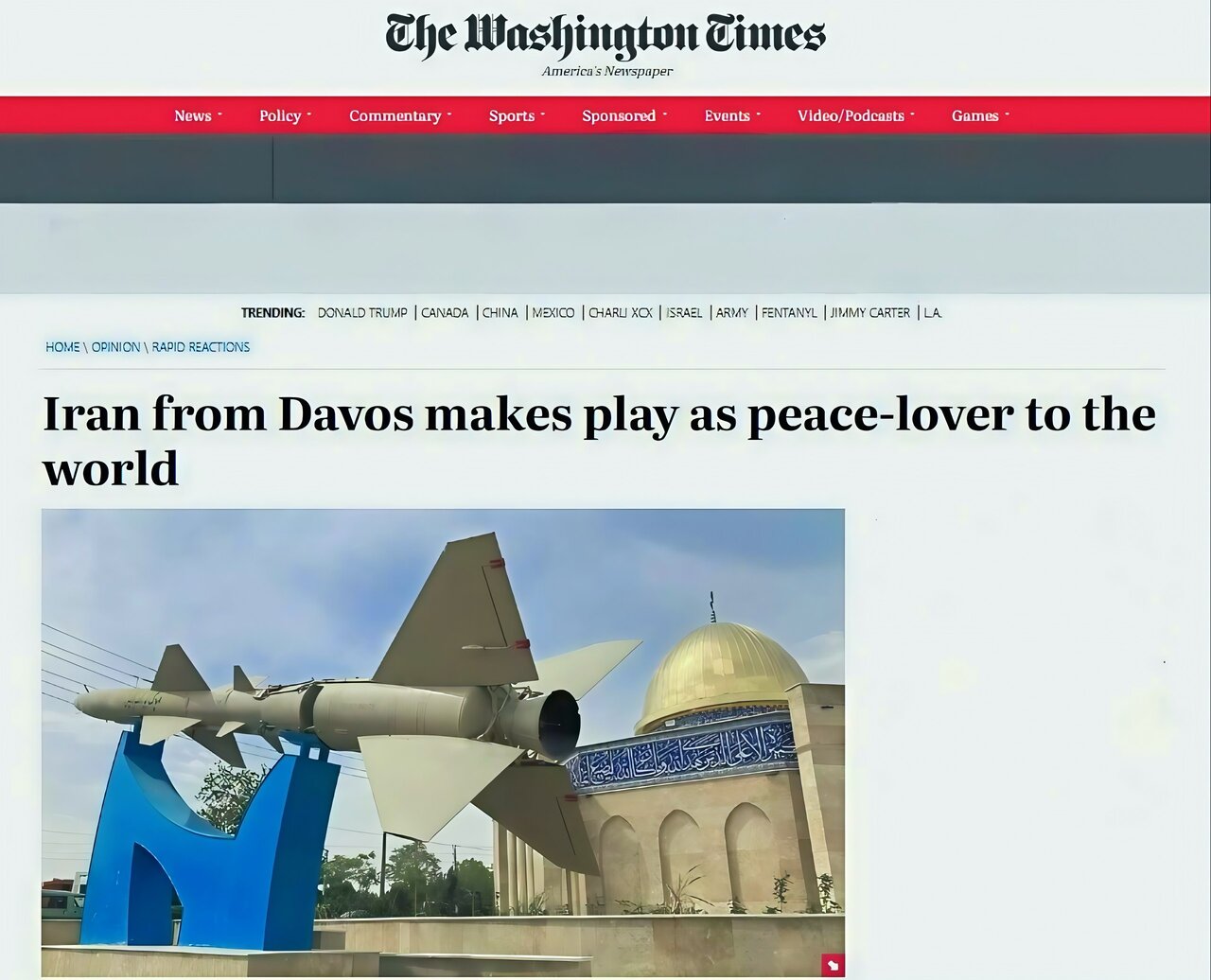How Zionists are trying to twist Zarif's message at Davos

TEHRAN – In a recent article published by the Washington Times, Cheryl K. Chumley presents a one-dimensional portrayal of Iran, framing the nation as a perpetual antagonist on the global stage.
Her piece, rife with allegations and rooted in artificially constructed stereotypes, calls for a critical examination.
The article falls into the trap of repeating long-standing Zionist and anti-Iran talking points without substantial backing.
Chumley's record of making baseless claims, such as her 2020 article titled "Coronavirus hype biggest political hoax in history," where she irresponsibly dismissed the severity of the disease, undermines her credibility as a journalist committed to factual reporting.
Her biased approach this time is evident from the outset, as she repeatedly labels Iran as "the nation that funds terror around the world."
The Washington Times' history of labeling the anti-apartheid leader Nelson Mandela a terrorist serves as a reminder of the dangers of one-sided narratives.
Mandela himself wrote about this in his book, when the paper's reporters visited him in jail: "They seemed less intent on finding out my views than on proving that I was a Communist and a terrorist. All of their questions were slanted in that direction."
No wonder Mandela was on the U.S. government terrorist list until 2008, as his struggle against apartheid involved resistance that contradicted America's hegemonic interests.
Chumley's portrayal of Iran echoes this legacy, prioritizing ideological alignment over journalistic integrity.
Furthermore, the article strongly attacked Iran's Vice President for Strategic Affairs, Mohammad Javad Zarif, depicting him as "a hypocrite and a double-dealer" sent by the Iranian government to “deceive” Americans.
However, this oversimplification ignores Zarif's nuanced role in public diplomacy.
His participation in the World Economic Forum in Davos was not a negotiation ploy but an effort to present Iran's perspective on the global stage.
Iran's foreign policy is determined at the highest levels of government, and the nation's positions are often reflected in the official statements of the Leader of the Islamic Revolution, Ayatollah Seyed Ali Khamenei, and President Massoud Pazeshkian.
Additionally, the Ministry of Foreign Affairs oversees official diplomatic engagements.
It's worth noting that Mohammad Javad Zarif is no longer serving as Foreign Minister, so his recent actions are part of public diplomacy efforts.
Zarif clarified in The Economist, "I write this not as a representative of the Iranian Government but solely in my personal capacity."
His goal in the recent World Economic Forum event in Davos, Switzerland was to counter false narratives and accusations against Iran made by Zionist and warmongering lobbies.
Chumley's narrative also ignores that Resistance movements in West Asia have origins predating the 1979 Islamic Revolution, driven by longstanding Israeli atrocities and occupation.
Zarif's Davos appearance effectively counters anti-Iranian narratives by highlighting these historical roots and Israel's persistent atrocious crimes, hence he was constantly attacked by warmongers and the Israeli regime's mouthpieces, for example, the Chumley.
He also emphasized Iran's strong deterrent power, challenging portrayals of Iran as weak or deceitful, and reinforcing its role as a supporter of legitimate Resistance and justice in the region.
Chumley's propagandistic narrative also disregards Iran's demonstrated willingness to engage in negotiations, as exemplified by the 2015 Joint Comprehensive Plan of Action (JCPOA).
The U.S.'s withdrawal from the agreement, rather than Iran's actions, undermined the diplomatic progress that had been achieved.
Furthermore, Chumley's articles attempt to discredit Zarif's diplomatic efforts by trivializing his statements at the World Economic Forum, yet fail to acknowledge the significant impact of his engagement.
His interview on the Forum's YouTube channel broke a two-year viewership record, underscoring the effectiveness of public diplomacy and the global interest in Iran's stance.
Zarif's comments at Davos revealed the spectrum of perspectives within Iran, as some of his views drew internal criticism.
This highlights a true diversity of opinions in Iran, challenging the article's portrayal of the country as a singularly aggressive force.
In an attempt to bolster her argument, Chumley resorts to speculative claims, such as "Word is Trump is going to take a tougher stance on Iran," without providing evidence or a robust analysis.
Such hearsay does little to contribute to a meaningful discourse on international relations.
The article’s endorsement of aggressive military action, quoting U.S. Senator Lindsey Graham's call for strikes against Iran's nuclear program with approval, is a stark example of her shameless warmongering rhetoric.
Chumley's statement about an attack on Iran, "Yes, that would be a good start," reveals her sociopathic bellicosity that dismisses the potential for diplomatic solutions.
She also states, "Diplomacy works if both sides want peace." Clearly, she and her band of Zionist hawks are devoid of any such peaceful intentions.
Leave a Comment